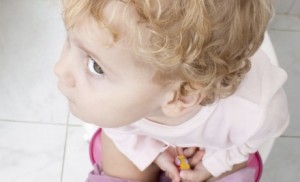Hurry up and slow down already. Your child’s potty training is up to him! You’re just there to help him along.
Dr. Miriam Stoppard, a leading child-care expert and author of Teach Your Child (DK; $15.95) says toddlers have to be ready both physiologically and emotionally for potty training and that you are there to simply help her along. While you’ve heard tales about successes from friends: “My son was potty trained at 9 months!” and “We did it in a weekend!,” the truth is potty training takes as long as a month or longer to master says Stoppard. Toddlers are physiologically ready to train by the age of 2, but serious efforts shouldn’t start until she stays dry for extended periods of time. Even after a toddler is trained, from time to time there will be accidents and minor setbacks.
Quick Potty Training Tips
• First, let your child learn from you. Show them how to use the the toilet and explain to them what you are doing and why. Don’t be embarrassed — your child certainly isn’t!
• Get your child a potty without making a big deal out of it, and explain that this is her own little potty just for her. Tell her that when she feels the need to go “pee pee” or “poo poo” this is the place to go.
• Don’t rush the process or create pressure for the child to succeed. At this point, if her interest is piqued, you’re doing fine!
• Try morning and afternoon potty sessions where you let him eat and play as normal, but every 15 minutes you put him on the potty.
• Try rewarding him for successes – stickers, army men, matchbox cars, M & Ms can work wonders
• Once your child has experienced some success, you can move him on to training pants or pull-ups. Show him how to use his thumbs to pull the pants down.
• Be patient with your child and don’t engage in a struggle if your child baulks.
• Stay calm and don’t rush the process.
• Give your child all the freedom and support she need to make her own mistakes.
• Your number one job as a parent is to provide positive encouragement and support — NOT disappointment!





